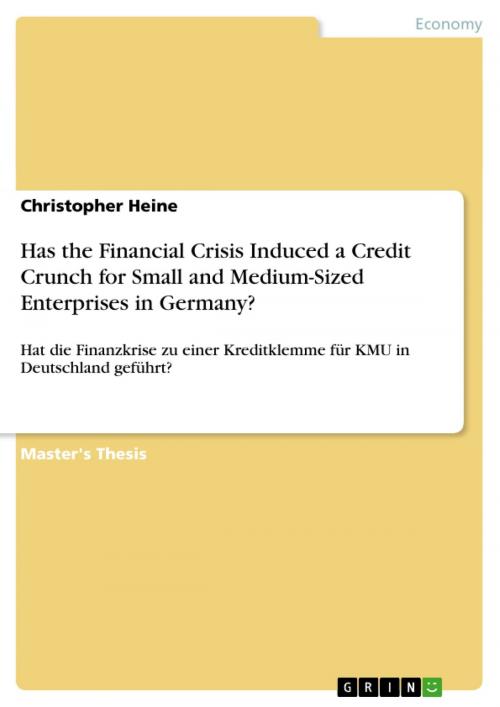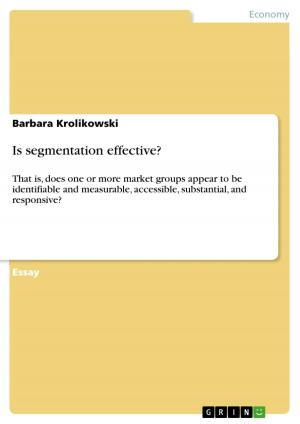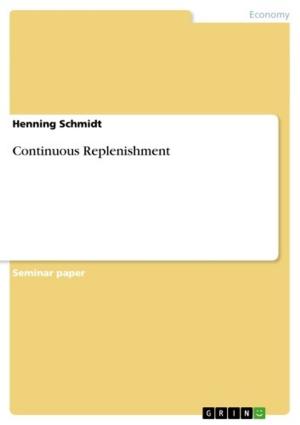Has the Financial Crisis Induced a Credit Crunch for Small and Medium-Sized Enterprises in Germany?
Hat die Finanzkrise zu einer Kreditklemme für KMU in Deutschland geführt?
Business & Finance| Author: | Christopher Heine | ISBN: | 9783640382170 |
| Publisher: | GRIN Publishing | Publication: | July 24, 2009 |
| Imprint: | GRIN Publishing | Language: | English |
| Author: | Christopher Heine |
| ISBN: | 9783640382170 |
| Publisher: | GRIN Publishing |
| Publication: | July 24, 2009 |
| Imprint: | GRIN Publishing |
| Language: | English |
Master's Thesis from the year 2009 in the subject Business economics - Miscellaneous, grade: 1,3, Otto Beisheim School of Management Vallendar, language: English, abstract: The following MBA-Thesis analyses how the financial crisis has affected different pre-conditions for the credit lending behaviour of banks. Additionally the demand for loans of potential borrowers will be considered. A 'credit crunch' is defined as a restriction of the credit supply which leads to a mismatch of supply and demand. It will be shown that the financial crisis caused a still ongoing macroeconomic contraction. The macroeconomic contraction has a direct effect on the calculation of rating grades which downgrade. Parameters of credit risk assessments will be analysed and their pro-cyclicality will be tested. Corporate rating grades already downgraded significantly in 2008. The downgrading of firms has an effect on the credit pricing which influences also the credit demand. This effect will be shown by explaining a basic cost-plus loan pricing model. The sensitivity of the loan pricing towards changes of attributed capital, refinancing costs and cost of default will be exemplarily shown. It will be shown that the rating downgrades have a significant effect on the credit price. This price increase which might affect the demand is however per definition not a 'credit crunch'. The Basel II Accord regulation links the requirements for banks' capital to rating grades. Prior to the financial crisis the capital of banks has already been close to the regulatory minimum level. This made the banks vulnerable for impairments on assets. As new sources for capitalisation and possibilities to off-balance assets are currently limited banks have to reduce risk-weighted assets to fulfil the minimum capital requirements. A reduction of risk-weighted assets could be inter alia done by a restrictive corporate lending policy. The restrictions on banks' capital will not decrease quickly as especially impairments on the credit book might increase due to upcoming defaults. Nevertheless a supply restriction gets only visible if the demand for credits is robust. The demand correlates among other points especially to the investments which have decreased since the end of 2008.
Master's Thesis from the year 2009 in the subject Business economics - Miscellaneous, grade: 1,3, Otto Beisheim School of Management Vallendar, language: English, abstract: The following MBA-Thesis analyses how the financial crisis has affected different pre-conditions for the credit lending behaviour of banks. Additionally the demand for loans of potential borrowers will be considered. A 'credit crunch' is defined as a restriction of the credit supply which leads to a mismatch of supply and demand. It will be shown that the financial crisis caused a still ongoing macroeconomic contraction. The macroeconomic contraction has a direct effect on the calculation of rating grades which downgrade. Parameters of credit risk assessments will be analysed and their pro-cyclicality will be tested. Corporate rating grades already downgraded significantly in 2008. The downgrading of firms has an effect on the credit pricing which influences also the credit demand. This effect will be shown by explaining a basic cost-plus loan pricing model. The sensitivity of the loan pricing towards changes of attributed capital, refinancing costs and cost of default will be exemplarily shown. It will be shown that the rating downgrades have a significant effect on the credit price. This price increase which might affect the demand is however per definition not a 'credit crunch'. The Basel II Accord regulation links the requirements for banks' capital to rating grades. Prior to the financial crisis the capital of banks has already been close to the regulatory minimum level. This made the banks vulnerable for impairments on assets. As new sources for capitalisation and possibilities to off-balance assets are currently limited banks have to reduce risk-weighted assets to fulfil the minimum capital requirements. A reduction of risk-weighted assets could be inter alia done by a restrictive corporate lending policy. The restrictions on banks' capital will not decrease quickly as especially impairments on the credit book might increase due to upcoming defaults. Nevertheless a supply restriction gets only visible if the demand for credits is robust. The demand correlates among other points especially to the investments which have decreased since the end of 2008.















